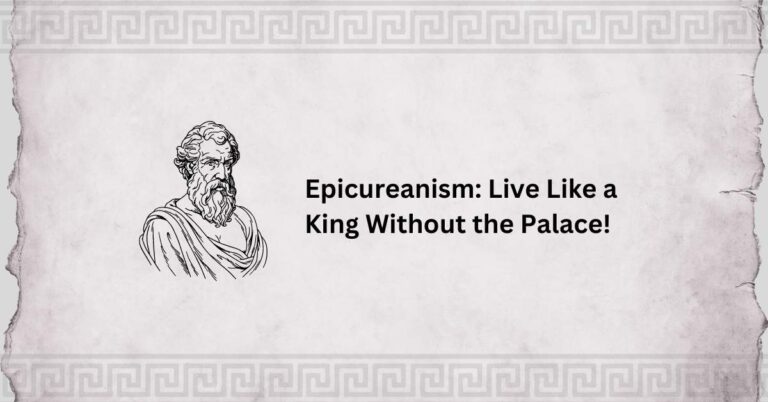Hedonism vs Utilitarianism: Unveiling Their Surprising Clash!
Have you ever wondered why some people chase pleasure while others strive to do the greatest good for the most people? This is where hedonism and utilitarianism come into play. They are two major philosophies that try to answer how we should live our lives.
Hedonism is all about seeking pleasure and avoiding pain. It’s the idea that pleasure is the highest good. Utilitarianism, on the other hand, focuses on maximizing happiness for the greatest number of people. It suggests that the best actions are those that produce the most overall happiness.
Understanding these concepts is crucial in ethical discussions. They help us navigate complex moral dilemmas and make better decisions. So, let’s dive into the fascinating world of “hedonism vs utilitarianism” and see what insights we can gain.
1. What is Hedonism?
Hedonism is the philosophy that pleasure is the highest good and the ultimate aim of life. Its roots go back to ancient Greece. Epicurus is a notable figure who promoted hedonistic ideas. He believed that simple pleasures lead to a happy and tranquil life.
Jeremy Bentham also explored hedonistic concepts. He introduced the idea of the hedonistic calculus, a way to measure pleasure and pain. This helps in deciding which actions to take for maximum pleasure.
There are several types of hedonism. Psychological hedonism suggests that humans naturally seek pleasure and avoid pain. Ethical hedonism proposes that seeking pleasure is morally right. Rational hedonism advocates for making decisions that maximize pleasure in a thoughtful and calculated way.
2. What is Utilitarianism?
Utilitarianism is the belief that the best action is the one that maximizes overall happiness. It’s the most common type of consequentialism. It focuses on the outcomes of actions, aiming to produce the greatest good for the greatest number. This philosophy has its origins with philosophers like Jeremy Bentham and John Stuart Mill.
Bentham laid the groundwork for utilitarianism, emphasizing the importance of consequences. Mill expanded on these ideas, stressing the quality of pleasures and the importance of higher moral goals.
Utilitarianism comes in two main forms. Act utilitarianism looks at the consequences of individual actions. If an action results in more happiness than pain, it is considered good. Rule utilitarianism, however, focuses on the consequences of following rules. If a rule generally leads to greater happiness, it should be followed.
3. Core Principles of Hedonism
At its heart, hedonism is about pursuing pleasure and avoiding pain. This philosophy believes that pleasure is the most valuable thing in life. Everything we do should aim to increase pleasure and reduce pain.
Hedonistic calculus is a tool used in this philosophy. It helps evaluate actions based on the amount of pleasure and pain they produce. Imagine a scale where you weigh the pleasure and pain of each action. The action that tips the scale towards more pleasure is the one to choose. This makes decision-making a bit like balancing a pleasure-pain equation.
4. Core Principles of Utilitarianism
Utilitarianism centers on the greatest happiness principle. This principle states that actions are right if they promote happiness and wrong if they produce the opposite. It’s about the collective well-being, not just individual pleasure.
Consequences play a crucial role in utilitarianism. The morality of an action depends on its outcomes. If an action results in the greatest good for the greatest number, it is considered the best choice.
Utilitarian calculus is similar to hedonistic calculus but broader. It measures the overall happiness an action produces for everyone affected. Think of it as a communal balance scale. The goal is to maximize happiness for the most people, making decisions that benefit the majority.
5. Differences Between Hedonism and Utilitarianism
Hedonism and utilitarianism, while both focused on maximizing positive experiences, diverge significantly in their approaches and applications.
Focus on Individual Pleasure vs Collective Happiness
Hedonism is fundamentally about individual pleasure. It suggests that each person should seek their own happiness and avoid personal pain. Imagine someone choosing to relax and enjoy a luxurious meal simply because it brings them joy. This is the essence of hedonism: personal satisfaction is the ultimate goal.
Utilitarianism, on the other hand, prioritizes collective happiness. It seeks the greatest good for the greatest number. Think of a policymaker who implements a program to provide free healthcare. The goal is to increase overall happiness, even if it means some personal sacrifice for the policymaker. The well-being of the community takes precedence over individual pleasure.
Immediate Gratification vs Long-term Consequences
Hedonism often favors immediate gratification. It values pleasure in the here and now, sometimes at the expense of future well-being. For example, indulging in a dessert might bring immediate joy, but it might not be the best choice for long-term health. Hedonists prioritize current enjoyment over potential future outcomes.
Utilitarianism, conversely, is concerned with long-term consequences. It evaluates the potential future impact of actions to ensure the greatest overall happiness. This approach might involve making decisions that don’t provide immediate pleasure but contribute to a better future. For instance, investing in renewable energy sources might not offer instant gratification but leads to sustainable happiness in the long run.
Self-centered Approach vs Community-centered Approach
Hedonism can be seen as a self-centered philosophy. It emphasizes personal pleasure and individual experiences. A hedonist might decide to spend money on a lavish vacation for personal enjoyment rather than donating to a charity. The primary concern is the individual’s own pleasure.
Utilitarianism, however, adopts a community-centered approach. It considers the well-being of others and aims to create the most positive outcomes for the largest number of people. For example, a utilitarian might choose to volunteer time to help the less fortunate, focusing on the broader impact on community happiness rather than personal gain.
Balancing Pleasure and Pain vs Balancing Overall Happiness
In hedonism, the balance is between personal pleasure and pain. Actions are judged based on how much pleasure they bring to the individual versus how much pain they avoid. This personal calculus can be highly subjective and varies from person to person.
Utilitarianism, on the other hand, uses a broader balance scale. It weighs actions based on their overall impact on community happiness. The utilitarian calculus involves considering how actions affect everyone involved, striving for the maximum net positive outcome. This requires a more objective assessment of consequences and benefits.
Ethical Implications
The ethical implications of these philosophies also differ. Hedonism may sometimes lead to ethical dilemmas where personal pleasure conflicts with societal norms or laws. For example, pursuing personal pleasure through activities that harm others or break laws poses ethical challenges.
Utilitarianism often aligns more closely with societal ethics, as it seeks the greater good. However, it can also lead to controversial decisions where the happiness of the majority justifies actions that might harm a minority. This raises questions about the limits of utilitarian ethics and the protection of individual rights.
6. Similarities Between Hedonism and Utilitarianism
Despite their differences, hedonism and utilitarianism share some common ground. Let’s explore these similarities.
Both Are Consequentialist Theories
First, both hedonism and utilitarianism are consequentialist theories. This means they judge actions based on their outcomes. The focus is on the results rather than the intentions behind the actions. In both philosophies, what matters most is whether the action leads to desirable consequences.
Imagine you decide to help a friend move because it makes them happy. Both a hedonist and a utilitarian would approve because the action results in a positive outcome. The hedonist sees the immediate pleasure it brings, while the utilitarian sees the overall increase in happiness.
Both Consider Pleasure and Happiness as Central to Ethical Decisions
Second, both philosophies place pleasure and happiness at the core of ethical decision-making. For hedonists, personal pleasure is the highest good. They believe that life’s ultimate goal is to maximize individual pleasure and minimize pain.
Utilitarians, while focusing on the collective, also aim to maximize happiness. They seek to increase overall well-being and reduce suffering for as many people as possible. In both cases, pleasure and happiness are key criteria for determining the rightness of actions.
Shared Focus on Well-being
Both hedonism and utilitarianism share a common concern for well-being. Whether it’s the well-being of the individual (in hedonism) or the community (in utilitarianism), the ultimate goal is to enhance life quality. This shared focus on improving lives is a significant commonality.
Influence on Modern Ethical Discussions
Both philosophies have significantly influenced modern ethical discussions. They provide frameworks for evaluating moral dilemmas, and helping individuals and societies make better decisions. For instance, debates about public policy, healthcare, and justice often draw on these theories to weigh the benefits and harms of different actions.
Ethical Calculus
Another similarity is the use of an ethical calculus. Hedonists use the hedonistic calculus to measure pleasure and pain, while utilitarians use a broader calculus to measure overall happiness. Both approaches involve weighing different factors to determine the most ethical choice.
Adaptability
Both philosophies are adaptable to various contexts. Hedonism can be applied to personal life choices, helping individuals seek happiness. Utilitarianism can be used in broader societal contexts, guiding public policy and ethical decision-making on a larger scale. This adaptability makes both theories relevant in diverse situations.
7. Practical Applications of Hedonism and Utilitarianism
Real-life Examples Where Hedonistic Principles Are Applied
Hedonistic principles often guide personal lifestyle choices. For instance, consider someone deciding to take a vacation. They choose a destination that promises relaxation and joy, prioritizing their own pleasure. This is a straightforward application of hedonism. Another example is indulging in hobbies like painting, cooking, or playing sports simply because they bring happiness and reduce stress. These activities are driven by the desire for personal enjoyment and the avoidance of discomfort.
Real-life Examples Where Utilitarian Principles Are Applied
Utilitarian principles frequently shape public policies and organizational decisions. For example, a government might implement a public health program to provide vaccinations. The goal is to maximize the health benefits for the largest number of people, even if it involves some costs. Another instance is a company deciding to implement eco-friendly practices. While these practices might be more expensive, they benefit the environment and society in the long run, aligning with utilitarian ideals of maximizing overall happiness.
Comparative Analysis of the Outcomes in Various Scenarios
Let’s compare the outcomes of hedonism and utilitarianism in a scenario involving charitable donations. A hedonist might donate to a cause that makes them feel good, such as supporting a local art museum they love. The primary motive is personal satisfaction. In contrast, a utilitarian would donate to a cause that maximizes overall benefit, such as funding vaccinations in developing countries to save the most lives. The focus here is on the broader impact.
In another scenario, consider workplace decisions. A hedonistic manager might prioritize perks that enhance their own work experience, like a luxurious office. A utilitarian manager, however, would implement policies that improve the well-being of the entire team, such as flexible working hours or wellness programs. The utilitarian approach aims to increase overall job satisfaction and productivity.
8. Criticisms and Challenges
Common Criticisms of Hedonism: Ethical Egoism and Moral Subjectivism
Hedonism faces criticism for promoting ethical egoism. Critics argue that focusing solely on personal pleasure can lead to selfishness and disregard for others’ well-being. This self-centered approach might justify harmful actions if they bring individual pleasure. Moral subjectivism is another criticism, suggesting that hedonism lacks objective standards. What brings pleasure to one person might cause pain to another, leading to conflicting moral judgments.
Common Criticisms of Utilitarianism: Demandingness Objection and Justice Objection
Utilitarianism also has its critics. The demandingness objection argues that utilitarianism requires individuals to make significant personal sacrifices for the greater good, which can be overly demanding and unrealistic. The justice objection highlights that utilitarianism might justify actions that are unfair to individuals if they benefit the majority. For example, sacrificing the rights of a minority group for the happiness of the majority raises ethical concerns about justice and fairness.
How Each Philosophy Addresses Its Critiques
Hedonism addresses ethical egoism by promoting a balanced pursuit of pleasure. Epicurean hedonism, for instance, advocates for simple, moderate pleasures that do not harm others. It encourages individuals to find joy in activities that are also socially acceptable and beneficial. Addressing moral subjectivism, some hedonists argue for a more nuanced understanding of pleasure, considering both personal and communal aspects.
Utilitarianism responds to the demandingness objection by advocating for a more practical approach. Rule utilitarianism, for example, suggests following general rules that typically lead to the greatest good, reducing the need for constant personal sacrifices. To address the justice objection, utilitarians emphasize the importance of protecting individual rights and ensuring fair treatment while still aiming for the greatest overall happiness. Some propose integrating principles of justice into the utilitarian framework to balance collective and individual well-being.
Conclusion
Hedonism and utilitarianism offer distinct but valuable perspectives on ethical decision-making. Hedonism emphasizes personal pleasure, advocating for a life that maximizes individual joy and minimizes pain. Utilitarianism, however, focuses on the collective good, aiming to maximize overall happiness for the greatest number of people.
Understanding these philosophies can enhance our approach to ethical dilemmas, helping us navigate complex choices in both personal and societal contexts. By considering both individual and collective well-being, we can make more informed and balanced decisions. Whether you lean towards hedonism’s focus on personal pleasure or utilitarianism’s broader view of happiness, both philosophies provide useful frameworks for evaluating our actions and their impacts.
Frequently Asked Questions:
What is the main difference between hedonism and utilitarianism?
The main difference lies in their focus. Hedonism prioritizes individual pleasure and personal happiness. It’s about seeking joy and avoiding pain on a personal level. Utilitarianism, on the other hand, aims for the greatest good for the greatest number. It focuses on maximizing overall happiness and minimizing collective suffering.
Can hedonism and utilitarianism be integrated?
Yes, they can be integrated to some extent. For example, an individual might pursue personal pleasure while also considering the broader impact of their actions on society. This hybrid approach can help balance personal satisfaction with collective well-being. By integrating elements of both philosophies, one can strive for a life that brings joy to oneself and benefits others.
Which philosophy is more practical in today’s world?
Both philosophies have practical applications, but their suitability depends on the context. Hedonism can guide personal lifestyle choices, promoting activities that bring individual happiness. Utilitarianism is often more applicable in policy-making and organizational decisions, where the goal is to benefit the largest number of people. In today’s interconnected world, a combination of both may be the most practical approach, allowing for personal fulfillment while contributing to the greater good.



